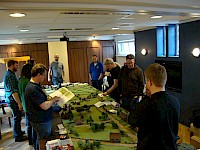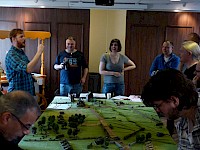Dutch wargaming
 One of the perks I have working for Wargames, Soldiers and Strategy is attending quarterly meetings at the head offices in Zutphen, Holland. It is far easier to discuss our strategy for future issues of the magazine in person rather than over the phone.
One of the perks I have working for Wargames, Soldiers and Strategy is attending quarterly meetings at the head offices in Zutphen, Holland. It is far easier to discuss our strategy for future issues of the magazine in person rather than over the phone.
In our last quarterly team meeting last weekend, my boss Jasper decided to arrange for me to meet a group of Dutch wargamers . There I could show some interested Dutch gamers how the Battlegroup series of games worked. Peter Van Dop kindly provided the forces I needed for the game.
Looking at the Overlord book, we had an ideal scenario to play: the Polish attack at St Sylvain (page 141). It required quite a few tanks, nearly a score of Shermans, and ten German armoured vehicles. Thankfully, Peter had the miniatures, which saved me taking anything from the UK with me (apart from some Perrys for some of the Dutch wargamers).
I did have some challenges with the language. While nearly all the Dutch gamers spoke English, their natural inclination was to speak in Dutch, which left me a little out of the circle at times. Being a typical Englishman, my foreign language skills are poor at best! However, things improved with the arrival of Arvid, Kees, Joop and Ardi who along with Peter were kind enough to speak in English for me.
Battlegroup Overlord is a fairly traditional wargame using the alternative turn mechanism. Player roll dice for how many units can be activated in a turn (we were playing a Company sized engagement so rolled 3D6 plus officers on table and could move that many units). Given the large number of tanks and infantry the Polish had, they soon had to make difficult decisions on what to activate and what to leave.
 Units may either area fire (in an attempt to pin a unit) or use aimed fire, which requires a roll to spot and a second roll to hit the target. Armour requires a 2D6 roll to penetrate the armour while infantry get a save (a single D6) depending on what cover they are in. Pinning is important: if a unit is pinned it will miss its next go. Morale is dealt with by “Battle Rating” – each time a unit is destroyed, a chit is taken from the bag. Each chit has a number on it, reducing the battle rating. The side which has lost the most from its battle rating loses.
Units may either area fire (in an attempt to pin a unit) or use aimed fire, which requires a roll to spot and a second roll to hit the target. Armour requires a 2D6 roll to penetrate the armour while infantry get a save (a single D6) depending on what cover they are in. Pinning is important: if a unit is pinned it will miss its next go. Morale is dealt with by “Battle Rating” – each time a unit is destroyed, a chit is taken from the bag. Each chit has a number on it, reducing the battle rating. The side which has lost the most from its battle rating loses.
The game was fast and furious, with both sides closing to almost point blank ranges and firing with their vehicles – the Germans were particularly reckless driving their tanks towards the enemy instead of taking up defended positions. It was particularly funny when the Tiger arrived only to be lost to a mine hit! Both sides had an excellent time. The game took just over 3 hours in total with the German player failing to call in a single barrage all game. However when the ‘Battle Ratings’ were added up it was surprisingly a minor German victory.
The game was good fun to play, with many nail-biting highs and lows, as one side took the advantage and then lost it. All the players took to Battlegroup Overlord well and expressed an interest in playing it again in the future. There was even talk of adapting it to modern warfare.
